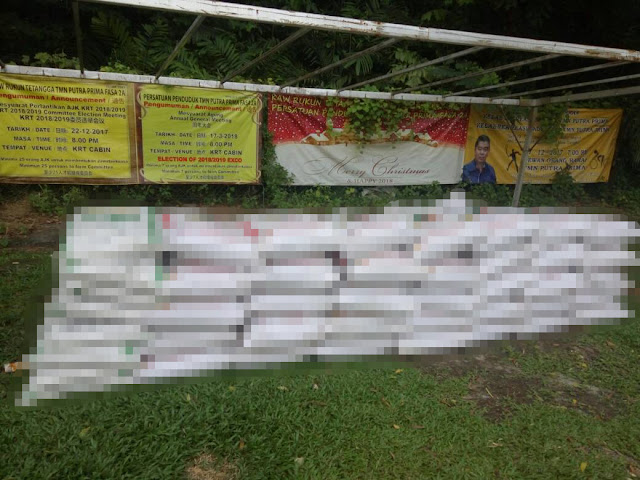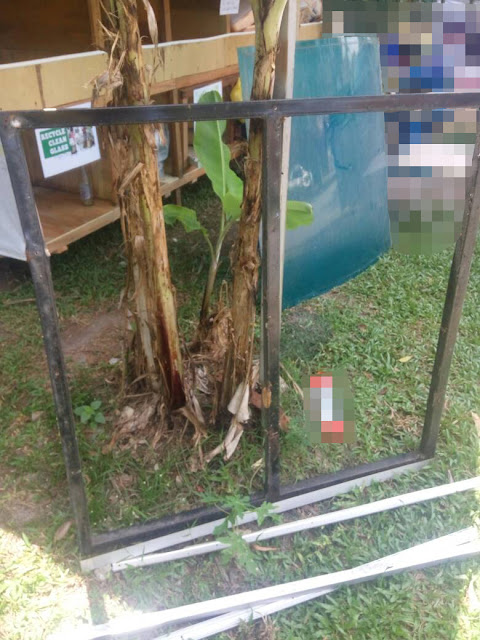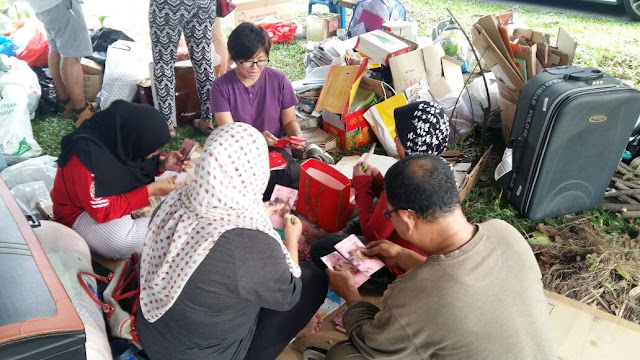The STAR
Metro NewsTuesday, 5 Jun 2018
By Grace Chen, Noel Foo & Kathleem Michael
 |
Chiew (left) has been serving the communities
of Kinrara and Puchong as Zone 14 JPP chairman. Picture shows him
assisting Taman Bukit Kuchai residents during a water disruption. —
filepic
|
The disbandment of Residents’ Representatives Committee (JPP) as announced by Prime Minister Tun Dr Mahathir Mohamad has drawn mixed reactions from the community.
While many are in support of the austerity measure, others recognise that the committee has done its part in helping the community.
StarMetro spoke to stakeholders in four districts to get their views over the move.
KajangAmong those supporting the move was Kajang Municipal councillor Lim Kim Eng, based on her experience with 36 residential areas as chairman of the Residents’ Representatives Council (MPP) for Zone 20.
Lim said many residents were not aware of the JPP’s presence in their community.
“They neither attend meetings with residents nor have an office, and residents’ complaints are passed back to the councillors to handle.
 |
A qigong event in Hulu Langat organised by Zone 8 JPP in Kajang.
|
“I feel that since JPP chairmen receive up to RM800 monthly each as allowance, they should address some of the complaints instead of leaving them all to the councillors,” she said.
JPP was founded by the Urban Wellbeing, Housing and Local Government Ministry (KPKT), serving as a bridge between residents and local councils especially in solving local issues.
JPP was launched by former prime minister Datuk Seri Najib Razak in May 2015. To monitor JPPs, MPP consisting of JPP chairmen and chaired by a person appointed by KPKT was then established.
However, the Selangor state government also had in March 2003 launched the Resident Representative Council (MPP) in Shah Alam, and subsequently instructed all local authorities in the state to form MPP. Each MPP receives funding from its respective local authority.
On the other hand, former Zone 8 JPP chairman Jackie Cheng Tin Sun, whose purview included 42 residential areas in Sungai Chua, felt it was unfair to tar everyone with the same brush.
“Whether or not a JPP chairman takes an active role in his community depends on one’s character. Some are very active, some are not,” he said.
Among the many activities he organised since 2015 were festive gatherings and crime awareness seminars, and he also highlighted residents’ grievances including houses damaged by construction of sewerage pipes.
Nevertheless, Cheng said the axing of the monthly allowance would not affect his involvement in community work.
“I have been an active member in several NGOs before I was appointed a JPP chairman, I will continue helping the community through these bodies,” said Cheng.
SepangOver in Sepang, Zon 4 JPP chairman Mohd Taufiq Hillary Abd Rahman Millie, said he would take the Federal Government’s decision to disband the body positively.
“I am going to take some time off to relax,” he said, noting that he secured a RM700,000 allocation from 1Malaysia Maintenance (TP1M), to be used for repairs and maintenance of four apartments in Taman Mas here.
 |
Mohd Taufiq secured a RM700,000 allocation for maintenance of four apartments in his capacity as the Zon 4 JPP chairman.
|
As a person who has been serving the community since 2015 before he took on the position in 2017, Mohd Taufiq said the allowance came in handy especially for travelling expenses.
Taman Taming Emas Residents Association chairman Ho Yon Kow said having an extra representative to forward their grievances to the local authority was a good thing.
“Although residents can approach the councillors, they may be too busy to attend to everyone. Therefore, the JPP still plays a useful role,” said Ho.
Taman Putra Prima Fasa 2A Residents Association president Terence Choong said although some felt JPP was a political agenda by Barisan Nasional, there was no discounting the fact that it had served as a platform for residents to highlight their issues, as local councils were more likely to pay attention to representatives of a larger segment of the community.
Subang JayaResidents of Puchong and Kinrara are used to turning to Zone 14 JPP chairman Lawrence Chiew for help to solve issues in the township, many even called him “one of the most hardworking people”.
Chiew started out as a secretary for Zone 14 JPP when the body was founded in 2016.
“My office was always open to residents. They were very happy because they did not need to send an email, they could just call me on my phone,” said Chiew.
“Even residents from other zones will call me, and I would always listen to their complaints.”
From issues such as faulty lamp posts to collapsed drains, faulty traffic lights, potholes, overgrown trees and flash floods, residents found it more convenient to send their complaints with photos to Chiew over WhatsApp.
Chiew would then visit the complainants, call for press conferences and the ensuing news reports almost always prompt immediate action from the local authorities.
As for the RM800 monthly allowance, Chiew said it was not enough to bear the costs of solving public issues.
 |
Cheng (fourth from left), who was Zone 8 JPP
chairman, at a lantern festival in Hulu Langat last year organised by
the committee with the help of several NGOs.
|
Chiew lost to Kinrara incumbent assemblyman Ng Sze Han in the 14th General Election.
As much as he wanted to continue helping residents despite the Government’s plan to scrap the programme, he feared he might not have the avenue anymore.
“The council and other agencies respected me as JPP chairman. But now they will ask me, ‘Who are you’?”
“What can I do? I can’t use any position to get complaints solved now. It will be difficult for me to help anyone now,” he said.
However, he said he accepted the decision, acknowledging the Government’s reasoning to save costs.
Nevertheless, he said that his office in Kinrara would be kept open to residents for now.
“My heart is to serve and help people, so I would like to continue doing that,” he said.
One of the residents that Chiew helped was Daniel Tan, 49.
Tan supported the body’s disbandment, saying that belt-tightening measures were necessary to cope with the nation’s debts and financial situation.
“However, I can vouch that Chiew is a hardworking man who does what he says he would do,” said Tan, adding that it would be a bonus if the Government could put him in a position where he could continue serving people.
Shah AlamThe abolishment of JPP will have minimal effect on the Shah Alam City Council (MBSA), which has a state programme called the Residents’ Representative Council (MPP) instead.
MBSA corporate communications head Shahrin Ahmad said there were 24 MPP zones, each headed by a councillor.
Similar to JPP, the MPP bridges the gap between council and residents, channelling residents’ grouses to the council and getting residents involved in council events.
The MPP in Shah Alam was set up in March 2003.
MBSA councillor and Zone 17 MPP chairman Foong Saik Hoong said his committee was made up of 18 active members who were representatives from residents’ associations, party representatives and non-government organisations. Zone 17 MPP consists of Section U3,U6 and U7
 |
Jackie Chew (centre) and her team are active in addressing problems such as faulty traffic lights in Kota Kemuning. — filepic
|
“The councillor selects who can be part of the committee and there should be no more than 24 members. The committee meets every month,” he said.
“The committee members will relay any problems residents face and help send out invitations for functions organised for residents,” he said.
Foong said the committee was given a yearly budget of RM60,000 and an additional RM5,000 for festive celebrations.
He said the money was largely used to organise gotong-royong, awareness campaigns and for contribution to community functions.
They also organise celebrations like Mooncake Festival and buka puasa events.
Kota Raja Wanita MCA chief Jackie Chew, who is also Zone 26 JPP chairman, said her involvement in helping residents would depend on party elections this year.
“We will concentrate on that first and then look into setting up a community service centre once we get direction,” she said, adding that she had been serving the community for 12 years.
Chew said the plan now was to monitor and scrutinise government policies.
Among her contributions were raising the need for an additional school in Kota Kemuning, and construction of the new school began before GE14.
She added that her team was active in highlighting the state government’s inefficiency in addressing problems in Kota Kemuning such as the flooded carpark in Jalan Anggerik Vanilla AD 31/AD, traffic jam at the Kota Kemuning roundabout, potholes and Chinese school issues.
SOURCE :
https://www.thestar.com.my/metro/metro-news/2018/06/05/coming-to-terms-with-disbandment-of-jpps/





















































